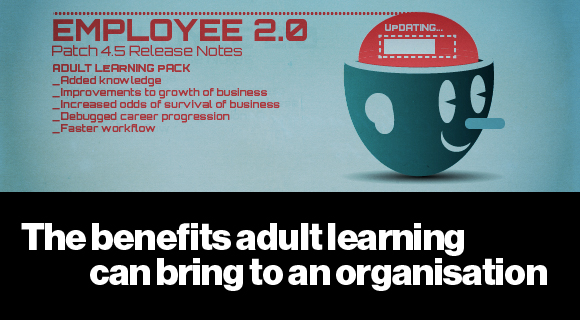The nature of work is changing. New developments in technology mean that people need to continually update their knowledge and how they use it. Learning and training are key to making sure businesses have the skills they need to survive and grow.
Training and learning – whether part of a formal course or not – is good for individuals and employers. For employers, having committed employees who do their jobs well is crucial in meeting customer needs. While the media often focuses on young people, many older workers will be changing jobs over the next 20 years. Adult learning plays an important part in making sure that businesses have the skills they need.
For individuals, learning can improve self-esteem, increase skills and support social mobility. A recent UK Commission research project found that low skilled employees want to access training and think it will help them do their jobs better and learn new skills. Employees who continue to learn are more engaged at work. Those who do not risk not being able to adapt to changes at work – whether new jobs, products, or technology.
Adult learning covers a wide range of ways of gaining knowledge and skills. For many people, training at work is an important element. The majority (59%) of employers invest in training. But 46% of the workforce receive no training – and those in low skilled jobs are least likely to receive training.
Providing training and opportunities for learning benefits employers. Firms that do not train their staff are almost twice as likely to close as those that do train. And in some business areas, such as hotels and restaurants, non-training firms are up to nine times more likely to close. More than eight in ten job openings are to replace people who have retired or left the labour market, so many employers are keen to recruit experienced staff. Having an adaptable workforce makes it easier to fill these posts.
High staff turnover and recruitment problems are a headache for businesses. Some businesses have roles they cannot fill because they can’t get applicants with the right skills or experience. They complain of increased workload for other staff, difficulties meeting quality standards, increased operating costs, and losing business to competitors. Providing training and development opportunities improves staff retention and increases job satisfaction.
However, making sure people can use their learning and new skills is important: three in ten businesses with retention difficulties recognise that lack of career progression is a problem. Providing training and opportunities for progression can cut recruitment costs and help retain valued knowledge. For example, Malmaison and Hotel du Vin saw staff turnover drop by 17% year on year after implementing a new approach to training. Red Carnation Hotels helps staff identify clear career paths, and has reduced staff turnover from 80% to 24% over eight years.
There’s a clear business case for employers to support learning, provide training and build a learning culture. For employees, barriers to learning include family commitments, a lack of suitable courses, cost, and lack of time. Employers can play a role in overcoming these by providing time to train, and having training managers or Union Learning Reps to support staff. It’s a win-win situation for learners and employers.
This blog was originally published on the NIACE blog. You can also follow NIACE on Twitter

Leave a comment